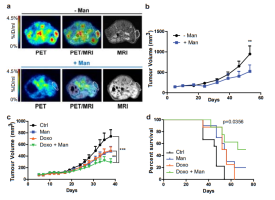https://www.nature.com/articles/s41586-018-0729-3
I think the mechanism is unlike normal cells (within reason) some cancers can't metabolise mannose effectively. So they get overwhelmed by the mannose increase, cant use glucose effectively & it acts as a way to hinder/destroy them.
The effect relies on levels of the PMI enzyme (phosphomannose-isomerase) as normal cells with decent pmi convert the mannose to a fructose. colon cancer with low pmi should be very suitable.
+ in the high PMI tumors high amounts of mannose itself might lower PMI by depleting the enzyme,/ overwhelm what the enzyme can process (but then this might effect healthy cells negatively too)

 www.ncbi.nlm.nih.gov
www.ncbi.nlm.nih.gov

 pubmed.ncbi.nlm.nih.gov
effect size @ 20% mannose in drinking water worked better than chemo"therapy"
pubmed.ncbi.nlm.nih.gov
effect size @ 20% mannose in drinking water worked better than chemo"therapy"
(and likely with way less toxicity / downsides "importantly, mannose had no negative impact on the health or weight of the animals over the time examined")

also lowers the number of tumors

And if someone combined this with :
. very low pufa + low-moderate fat diet
. lipolysis/fatty acid inhibition +
. lipogenesis inhibition (high in cancer cells Lipogenesis and lipolysis: the pathways exploited by the cancer cells to acquire fatty acids mainly utilizing glutamine i think and 1 other i cant remember) / fatty acid synthase inhibitors e.g some polyphenols
then i bet the effect size would be way better
(as glucose utilization would be blocked by mannose + then fatty acids would be too , so the cancer cells would mainly have lactate to rely on, but very little fuel to use considering glucose & fats are the main fuels, the problem is you'd have to pick a mannose dose that wouldnt hinder glucose utilization by healthy cells this way for more of a selective effect on low pmi cancers)
mannose in doses around a couple grams daily doesn't hinder regular cell function,
actually it stimulates mitochondria respiration mildly & helps colitis ~2.5g human dose
https://www.ncbi.nlm.nih.gov/pmc/articles/PMC9381535/

I think the mechanism is unlike normal cells (within reason) some cancers can't metabolise mannose effectively. So they get overwhelmed by the mannose increase, cant use glucose effectively & it acts as a way to hinder/destroy them.
The effect relies on levels of the PMI enzyme (phosphomannose-isomerase) as normal cells with decent pmi convert the mannose to a fructose. colon cancer with low pmi should be very suitable.
+ in the high PMI tumors high amounts of mannose itself might lower PMI by depleting the enzyme,/ overwhelm what the enzyme can process (but then this might effect healthy cells negatively too)

Phosphomannose Isomerase High Expression Associated with Better Prognosis in Pancreatic Ductal Adenocarcinoma
Pancreatic ductal adenocarcinoma (PDAC) is the fourth leading cause of cancer-related death in the United States. The need for increased patient survival has not been met for PDAC. The addition of mannose to conventional chemotherapy leads to accumulation ...

Mannose and phosphomannose isomerase regulate energy metabolism under glucose starvation in leukemia - PubMed
Diverse metabolic changes are induced by various driver oncogenes during the onset and progression of leukemia. By upregulating glycolysis, cancer cells acquire a proliferative advantage over normal hematopoietic cells; in addition, these changes in energy metabolism contribute to anticancer...
(and likely with way less toxicity / downsides "importantly, mannose had no negative impact on the health or weight of the animals over the time examined")
also lowers the number of tumors
And if someone combined this with :
. very low pufa + low-moderate fat diet
. lipolysis/fatty acid inhibition +
. lipogenesis inhibition (high in cancer cells Lipogenesis and lipolysis: the pathways exploited by the cancer cells to acquire fatty acids mainly utilizing glutamine i think and 1 other i cant remember) / fatty acid synthase inhibitors e.g some polyphenols
then i bet the effect size would be way better
(as glucose utilization would be blocked by mannose + then fatty acids would be too , so the cancer cells would mainly have lactate to rely on, but very little fuel to use considering glucose & fats are the main fuels, the problem is you'd have to pick a mannose dose that wouldnt hinder glucose utilization by healthy cells this way for more of a selective effect on low pmi cancers)
Cancer cells with low MPI levels are unable to catabolize efficiently mannose-6-phosphate, which accumulates intracellularly and impairs glucose utilization
As mannose did not reduce intracellular glucose, but significantly impacted cell growth, we considered it may interfere with glucose metabolism. We also observed that mannose does not produce much lactate (indicating it is poorly metabolised) and more importantly, that mannose markedly reduces lactate production from glucose. mannose treatment not only affects pools of glycolytic intermediates, but also those involved in the TCA cycle, pentose phosphate pathway and glycan synthesis
mannose in doses around a couple grams daily doesn't hinder regular cell function,
actually it stimulates mitochondria respiration mildly & helps colitis ~2.5g human dose
https://www.ncbi.nlm.nih.gov/pmc/articles/PMC9381535/
Attachments
Last edited:


